
What Happened in Austria?
Rüdiger Halder
Another victory for our people.
Just a few weeks before Americans voted in a black socialist as president, Austrians rocked the European political establishment by handing a stunning victory to nationalists who openly oppose non-European immigration and the loss of sovereignty to the European Union. It was a breakthrough unthinkable in any English-speaking country, and again confirms that the brightest political hopes for our people are in the nationalist parties of small European countries such as Belgium, Denmark, Switzerland, and Austria.
The numbers were dramatic: In the September 28 parliamentary elections, Joerg Haider’s new party, the Alliance for the Future of Austria, increased its share of the vote from 6.59 percent to 10.4 percent, while his old party, the Austrian Freedom Party, went from 11.04 percent to 17.54 percent. If the two nationalist parties had been a single party, their combined total of 28 percent would have made them the number-two party in Austria. As it was, the Alliance and the Freedom Party achieved something nearly unprecedented: two nationalist parties dramatically increased their support in an election in which they competed against each other.
 |
| “Social security for our people. They are against HIM because HE is for YOU!” |
|---|
On October 11, euphoria on the right was dampened when the charismatic Haider died in an automobile accident, but this did not change the assessment of the results by the pro-establishment Wiener Kurier: The general elections were “the biggest move to the right in the history of the post-war republic.” “This is madness, what this means is simply appalling,” wailed Erwin Wurm, one of the country’s best known sculptors. The Daily Telegraph in Britain fretted that “from the outside, it looks at best distasteful; at worst, downright sinister.”
How did post-war Austria, a cozy, Alpine country better known for Mozart and skiing than for politics, come to stand for the worst in “right-wing extremism”? Is this a success that can be repeated elsewhere?
| It was a breakthrough unthinkable in any English-speaking country. |
|---|
The story goes back to 1986, when the Freedom Party transformed itself by choosing the young, ambitious Joerg Haider as its leader. The party, earlier known as the League of Independents, had started as a grab bag of social liberals, free marketers, pan-German nationalists, national socialists, and almost anyone who felt unrepresented in Austria’s political system long dominated by the mildly liberal Social Democratic Party and the mildly conservative People’s Party. The Freedom Party was thus little more than a movement of eccentric protest against a system that represented a career in politics and “jobs for the boys” rather than deep political conviction.
Haider quickly gave a sharp focus to this collection of gadflies. He was intensely skeptical of the European Union and hostile to non-European immigration. He argued that the two major parties’ ineffective and lackluster politics allowed outsiders so much control over Austrian policy that the country might eventually disappear as a sovereign state. He downplayed pan-Germanism, and gave the party a more specifically Austrian tone.
No doubt most important, Haider was charismatic, likeable, and knew how to exploit the growing feeling among voters that the two major parties took them for granted. He spoke frankly about problems the establishment parties ignored, such as the cultural threat posed by immigration, and the menace of non-white crime.
Accusations of ‘Nazism’
Haider, originally from the southern province of Carinthia, concentrated his political efforts there, and was elected governor in 1989. It was in a debate in the provincial parliament two years later that he famously observed that Hitler had had a “proper employment policy,” unlike that of his political opponents, the Social Democrats. Haider also raised hackles when he said that “the Waffen-SS was part of the German military and because of that it deserves every honor and recognition.” In the land that was Hitler’s birthplace, mild observations of this kind invariably prompt accusations of “neo-Nazism.”
Haider was therefore a controversial, internationally-known figure by the time of the 1999 general elections, in which the Freedom Party won an astonishing 26.9 percent of the vote, catapulting it into second place behind the Social Democrats and just ahead of the more conservative People’s Party. Like all “far right” movements, the Freedom Party had been in political quarantine, so it was out of the question that it should govern with the Social Democrats, but to the horror of much of the “civilized” world, the People’s Party finally agreed to a coalition. “Extremists” were finally in power in a European country.
| Mr. Strache steered even more to the right than Haider, and leftists saw the party’s slogans as thinly-disguised racialism. |
|---|
Although as leader of the larger party in the coalition Haider should, by rights, have been chancellor, he stayed out of government entirely, and let the leader of the People’s Party, Wolfgang Schuessel, take the top job. Despite this important concession to “respectability,” the European Union put Austria into the deep freeze, as politicians made themselves ridiculous trying to see who could most insult the Austrians. At a February 2000 meeting in Lisbon of European Union ministers—the first to be attended by a Freedom Party representative—so many speakers rose to condemn the Austrians that Portuguese Labor Minister Eduardo Rodrigues had to tell them to stick to the agenda. The usual welcoming ceremony was scrapped to spare the anti-Austrians the discomfort of having to appear in a social setting with “racists.” “We will not accept anyone who attacks the basic principles of European civilization,” sniffed Portuguese Prime Minister Antonio Guterres.
At a February 28 ministerial meeting in Portugal, André Flahaut, the Belgian delegate, skipped lunch to protest the presence of Austrian Defense Minister Herbert Scheibner. “I don’t eat with fascists,” he explained. Belgian foreign minister Louis Michel went so far as to say that Europe “does not need Austria,” and other Belgian ministers complained that the rules for expulsion from the EU were too vague. Prince Charles of England and pop musician Lou Reed canceled trips to Austria. Italian fashion designer Guglielmo Mariotto exhibited a skirt emblazoned with a picture of Joerg Haider, a swastika, and the word “No” written in red.
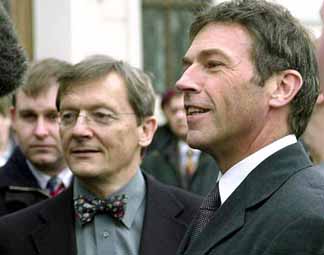 |
|
Haider (right) with coalition partner
Wolfgang Schuessel. |
|---|
Chancellor Schuessel calmly stood his ground, and gradually the Europeans stopped behaving so childishly. Mr. Schuessel later claimed he had decided to involve the Freedom Party in the responsibilities and “demystification” process of government before it became any stronger, and that tactic seemed to be working. Haider, who believed he could control the Freedom party members in the cabinet from his stronghold in Carinthia, found the job of puppet-master harder than he had expected. Government at the national level, especially coalition government, required compromise and poise. The old hands in the People’s Party outmaneuvered the Freedom Party, which found itself racked by internal squabbles. In 2002, two Freedom Party cabinet members resigned, and the coalition broke up.
Chancellor Schuessel seized this opportunity to blame the Freedom Party for sabotaging the government, and called a snap election. It was, as he well knew, perfect timing for himself and his party, and the worst possible moment for the divided Freedom Party. Mr. Schuessel presented the People’s Party as serious, prudent statesmen and the Freedom Party as querulous, destructive, and disunited. Support for the Freedom Party collapsed from 26 percent of the vote to just over 10 percent, and Austria went back to another version of the stale old People’s Party/Social Democrat combination that had run the country for decades. Many Austrians believed that the right-wing bogey had been laid to rest for good. The Greens were advancing steadily, and at nearly 10 percent of the vote seemed poised to overtake the Freedom Party.
In the aftermath of this setback, in what could have been a mortal blow to Austrian nationalism, Haider and some of his top lieutenants decided to start a new party, the Alliance for the Future of Austria. The reasons for the breakup were complex, but personality conflicts between Haider and a former protégé, Heinz-Christian Strache, appear to have been one reason. Mr. Strache, who soon took over the Freedom Party, is a remarkable man in his own right (see sidebar, page 5), and now that Haider is gone, he is the key figure in the Austrian nationalist movement.
In the next elections, in 2006, many people expected Haider’s Alliance, like so many splinter parties, to drop out of sight. Likewise, without its high-profile leader, the Freedom Party might have gone into decline as well, but instead of trimming his sails as any mainstream politician would have done, Mr. Strache steered even further to the right. He took an uncompromising stand against immigration, and many leftists saw the party’s slogans as thinly-disguised racialism. One was “Vienna must not become Istanbul,” a variant of the Haider-era slogan of “Vienna must not become Chicago.” The Strache version was aimed straight at Vienna’s Turkish minority, and evoked the defeat of the Ottoman Empire in the Battle of Vienna in 1683. Another slogan aimed at Muslims was “Pummerin, not muezzin.” Pummerin is the name of the main bell of St. Stephan’s Cathedral in Vienna, and is a symbol of Christianity.
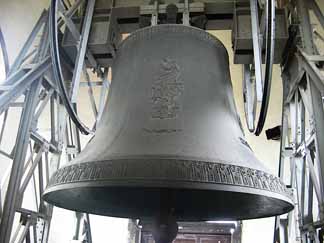 |
| Pummerin. |
|---|
Other provocative slogans were “At home, not Islam,” and “Jobs, not immigration.” The slogan “German, not ‘I don’t understand’,” was a clear poke at people who live in Austria but cannot speak German. Haider marveled at these outspoken campaign themes, noting that the press would have roasted him if he had been so blunt.
The results were nothing like the death knell for nationalism the Left was hoping for. Even without Haider, the Freedom Party went from 10 to 11 percent of the vote, and Haider’s Alliance squeaked into parliament with just over the 4 percent required for representation. The combined vote total of the two nationalist parties, at 15 percent, represented a 50 percent increase in support over the disaster of 2002.
One important aspect of the 2006 elections was the role of the Green Party. It had been the fondest desire of the Left that any frustration with establishment parties be funneled into support for the pro-immigrant, internationalist Greens. This tactic has been a great success in Germany, where distaste for the traditional parties has been molded into a dangerously internationalist, multi-racialist and pro-EU movement. However, Austria has nothing like Germany’s strong, left-wing subculture or its leftist media domination. At the same time, close neighbors in German-speaking Switzerland have been shifting towards the Swiss Peoples Party, which is a virtual twin of the Freedom Party. The Greens pulled into third place behind the Social Democrats and People’s Party, but were outnumbered by the combined Freedom/Alliance vote.
Even hostile commentators felt compelled to acknowledge the appeal of the new Freedom Party leader. Shortly before the election, the Swiss establishment paper, the Neue Zuricher Zeitung, called Mr. Strache “a figure of hope ... for the underprivileged, globalization losers and every incorrigibly nostalgic national socialist ... people who were ready to suffer persecution and become martyrs for the sake of their leader.” The Freedom Party had clearly switched one charismatic young leader for another.
 |
| Joerg Haider (right) and Heinz-Christian Strache. |
|---|
After this partial recovery in 2006, what led to the breakthrough in 2008? Partly, it was a matter of timing. The reason for the sudden election was a disastrous attempt by both members of the ruling coalition, the People’s Party and the Social Democrats, to steal the nationalists’ clothes and appeal to ordinary Austrians. That the old coalition dinosaurs thought they had to imitate Haider and Mr. Strache shows how much the wind was blowing in the nationalist direction. The trouble was that the establishment parties adopted two different—and, to them, conflicting—planks from the nationalist platform, and the collision brought down the coalition.
To the horror of the Social Democrats, the People’s Party adopted the Haider/Strache plank of immigration control and a hard line on crime. To just as much horror on the part of the People’s Party, the Social Democrats adopted the plank of sovereignty, demanding a referendum on the Lisbon Treaty, which would substantially increase the powers of the European Union. New powers for Brussels are usually approved by governments over the heads of the people, but Austrians, who are among the most anti-EU people in Europe, were demanding a direct say.
The dissolution of the coalition that resulted from these conflicting policies brought elections at a moment that was as fortunate for Austrian nationalists as the elections of 2002 had been disastrous. Neither of the governing parties had adopted enough of a nationalist position to divert nationalist votes, and their squabbling seems to have discouraged their own supporters from voting. Voter turnout in 2008 was at a historic low, which helped the more-committed nationalists.
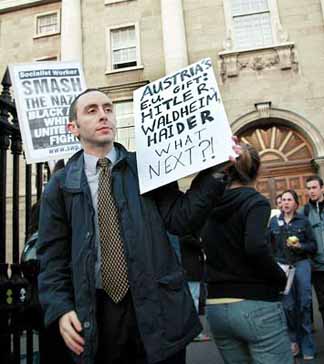 |
| Anti-Haider protest in 2003. |
|---|
Both Haider and Mr. Strache were in excellent form for the campaign. They were charming but serious, dynamic, and committed to a neutral and independent non-Islamic—that is to say white—Austria. Both men emphasized that they represented hard-working taxpayers against vested interests and large organizations determined to smother Austria’s sovereignty by expanding the reach of the EU and committed to bleeding Austrians to pay for immigrants and parasites. It is my own impression that Austrian voters are particularly unforgiving of politicians who strike poses or curry favor, and both leaders benefited from their unquestioned sincerity. The two-party coalition was seen more clearly than ever as power-sharing by elites who ignore the people.
By 2008, Haider and Mr. Strache disliked each other intensely but kept their rivalry well within the bounds of courtesy. In a pre-election debate they refrained from invective and were courteous in the extreme. Haider gently noted that Mr. Strache was offering ideas that Haider formulated long ago and continued to present in his own party, while Mr. Strache accused Haider—in the nicest possible way—of betraying his followers by walking out on the Freedom Party. The high demeanor of both men unquestionably helped their parties, which concentrated on promoting policies rather than attacking each another.
During the campaign, the establishment parties, Social Democrats and People’s Party alike, stumbled over just how nationalist they dared to be while the Greens went full tilt the other way. They called for an unconditional right for all immigrant children and adolescents to stay in Austria, no matter what their legal status, and pushed for automatic citizenship for any child born to a legal immigrant.
The Greens also promoted Turkish membership in the European Union, and the nationalists benefitted from opposing this idea. Given their strong anti-Islamic history, Austrians do not want their prosperous republic swamped by Turks looking for higher wages. Austrians are well known for their love of order, respect for the law, exactness, diligence, reliability, politeness and cleanliness—not the first characteristics associated with Turks.
 |
| Austria for Austrians! |
|---|
The Freedom Party’s campaign slogans were not quite as frank as in 2006, but were still clearly nationalist: “Our land for our children,” “Asylum fraud means a flight back home,” “Representatives of the people instead of EU traitors.” Many posters portrayed a smiling Mr. Strache, with the slogan, “They are against HIM because HE is for YOU.”
Haider’s party portrayed its leader as a hands-on guy, sleeves rolled up, ready to tackle problems. One of his posters had a line that could not have been clearer: “Austria for Austrians—for your sake.”
When the results were in, both establishment parties had lost about 8 percent of their 2006 support, and the Greens were down 1 percent. The Social Democrats were still the largest party at 29 percent, and their current leader, Werner Faymann, was charged with forming a government. Mr. Strache has made it clear that he will not join a coalition unless there will be referenda on the Treaty of Lisbon and letting Turkey into the European Union, so this probably rules out a coalition with either of the establishment parties.
If the People’s Party, which already took the Freedom Party into coalition in 2000, were willing to work with the nationalists, the combined vote of the three parties would be 54.22 percent—enough for a coalition majority—but Austria may not yet be ready for a government so heavily tilted towards the right. As of this writing, the People’s Party and the Social Democrats were trying to cobble together a government, but this amounts to trying to piece back together the coalition that collapsed just a few months ago—and with far less popular support. The two parties will no doubt try to put enough new faces into the cabinet to make the government appear to be something other than business as usual, but no one will be fooled. If the coalition busts up again, the nationalists are poised for an even greater victory.
What are the prospects for reuniting the Alliance with the Freedom Party now that Haider’s sudden death has removed the personality conflict between the two groups? On October 6, just five days before his car wreck, Haider spoke out against a merger, arguing that the two parties had developed in different directions and could win more votes separately than they could together. There is some justification for this view, as the Freedom Party seems to have attracted frustrated Social Democrats, while the Alliance poached from the People’s Party. Activists on both sides favor a merger—partly because there is no one in the Alliance with the stature to take Haider’s place—but nothing is settled.
Austria and the European Right
Although it is has been widely claimed that the 2008 election represented a “shift to the right,” I interpret the results slightly differently. European voters are increasingly turning to parties that represent not so much their nation as their tribe or locality. They want politicians who “speak their language,” in what is not so much a right-wing or racialist impulse as a tribal and regional one. The reason people talk about a “right-wing surge” is that common voter complaints embrace typical right-wing themes. However, right-wingers who stick to the language of centralized nationalism rather than regionalism do not get good results.
Britain’s BNP (British National Party), for example, has yet to achieve anything like the Freedom Party’s successes. Even in its best years, “British” nationalism never made an impression on the “Celtic fringe.” It is the liberal-left Scottish National Party that is set to become Scotland’s leading party.
In France we find similar failure. The National Front, another centrist and anti-regional party, which flies the flag of the fanatical Jacobins of the French revolution, has been unable to break out of a nostalgic nationalist ghetto. In Italy, by contrast, the Northern League, which calls for greater autonomy for the North and has no brief for Italian unity and little love for the Italian flag, is stronger than ever.
Others have noted that if Germany had been divided between North and South rather than East and West, there would have been no need for a wall, since the real divide is between the Catholic conservative South of Austria and Bavaria and protestant liberal Germany to the North. In Germany, nationalist parties have always been extremely centrist. This is not the only reason for their near-total failure, but it is surely not a coincidence that success in Germany—such as it is—is nearly always regional.
This was clear in local German elections held at the same time as the Austrian vote but that attracted little interest outside the country. For the first time in half a century, the Christian Social Union, the Bavarian sister party of the ruling Christian Democratic Union, failed to win more than 50 percent of the vote. The votes it lost did not go to other establishment parties but to a newly-formed association of what is known as free voters. Its demands echoed, albeit in more moderate form, the demands of the nationalists across the border in Austria, namely, stricter immigration control, more financial accountability, and skepticism about central government, whether in Berlin or Brussels. These local efforts are, I believe, the type likely to succeed in the years to come.
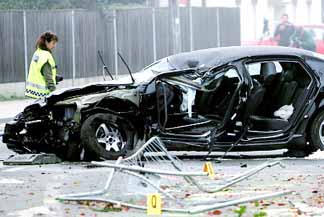 |
| All that was left of Haider’s Volkswagon. |
|---|
Ireland’s rejection of the Lisbon Treaty earlier this year can be seen in the same light. Unlike every other European nation, whose legislatures approved the treaty without consulting the people, Ireland had a chance to speak for itself. In June of this year, to the consternation of almost the entire political class, the Irish rejected the treaty, 53 to 46. There is a good chance other electorates would have done the same thing—the Austrians almost certainly will if they get the chance—and the Irish vote was welcomed across Europe by nationalists who were delighted that at least one country had been able to foil the elites who flout the people’s wishes. Just one rejection by a member state is supposed to kill the treaty, but European bureaucrats have been busy extending deadlines, and are studying plans to browbeat the Irish into “correcting” their lamentable mistake.
The possibility that Austria could follow Ireland and reject the treaty is a nightmare for the European ruling class, which will stop at almost nothing to prevent Austrians from curbing the consolidation of European Union power or—even more horrible—from leaving the union altogether. The 2008 elections have actually put some of these unthinkable options on the table.
In an increasingly global world, more and more Europeans want to “come home” to a local identity. They want local politicians who truly represent them and speak their language. This, I believe, is what is behind the dramatic results in the Austrian elections.
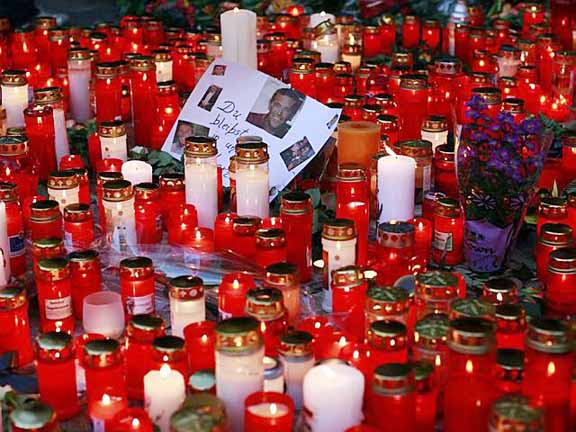 |
| A spontaneous memorial at the scene of the accident. |
|---|
Reasons for success
There are many reasons for the 2008 surge for the nationalists, and here are a few that come to mind. First is the quality of the parties’ leaders. Both were remarkably adept in public and with the media, and seemed positively to enjoy themselves on television. They were constantly on the attack and never gave opponents a chance to pin them down. They are both so articulate and quick-witted that I have never seen them caught flat-footed. They never came across as cultish or eccentric, but as attractive, sensible, self-possessed men with the courage to say what other politicians may believe but dare not say. However much they disliked the “racists,” media producers knew Haider and Mr. Strache guaranteed big ratings.
They were also helped by circumstances. The Austrian media are somewhat fairer than in many countries—Germany, Britain, and the United States, for example—where the press invariably misrepresents the aims and intentions of anyone hostile to the system. At the same time, liberal smears against the entire nation of Austria since the time of Kurt Waldheim have backfired. In 2000, even people who had not voted for the Freedom Party were incensed at the high-handed way Europeans reacted to the coalition government. There is no better way of making apathetic individuals into racialists or patriots than to insult them on the grounds of race or nation.
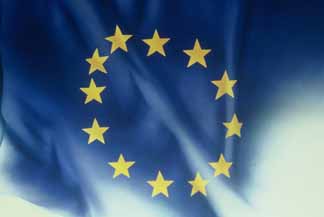 |
| Not the Austrians' favorite flag. |
|---|
Another advantage for Austria is that it is a small country, homogeneous and compact. A politician does not have to appeal to so many contradictory interests, so any populist revolt, whether Left, Right, or Green, has more fertile soil. Moreover, Haider’s Alliance is deeply rooted in its home base of Carinthia and enjoys a quasi-tribal support that may have as much to do with Carinthian identity as with conservatism. Again, the revolt appears to be in the name of the tribe, not of nation or race.
Yet another advantage is that being Austrian is still largely a matter of ancient ethnicity. The non-white citizen population is low, so being a nationalist does not require a defense against the charge of “alienating large numbers of our fellow citizens,” as it does in France, Britain, or Germany. Austrians can define themselves as distinct from Germans or German-speaking Swiss, so nationalism does not immediately take on the racialist aroma that the mainstream parties and media find so frightening.
At the same time, all over Europe, support for large established parties is no longer assured. The same economic forces breaking up community identity are also destroying the social cohesion upon which the traditional parties rely. They can no longer take their constituencies for granted because voters are tired of the old way of doing business. (It is my impression that in America, political options are sharply limited by the Democrat/Republican duopoly and this creates similar frustrations. If America had a parliamentary system, there would certainly be Green, Libertarian, and nationalist congressmen, who would relieve the tedium of a profoundly conformist legislature.)
Another factor in the nationalists’ favor is that after years of campaigning, Haider and Mr. Strache had reached a threshold of power and prestige that once crossed makes progress much easier. Many people now respect the Freedom Party simply because it has succeeded. Authority behaves differently towards men with power than it does towards men on the fringe, and success brings more success.
Both the Freedom Party and the Alliance have robustly criticized other parties when they disagree, but have cooperated on specific issues whenever that was possible. They have thus avoided a “them against us” ghetto mentality and have managed not to be seen as complete outsiders.
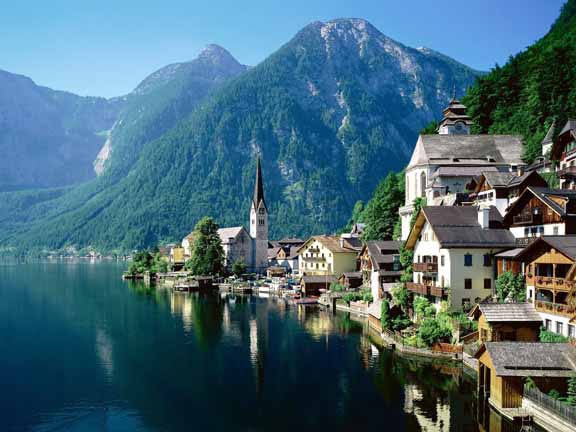 |
| The Austrian town of Hallstatt: a good place for Turks? |
|---|
The Freedom Party’s strong support also makes it impossible for leftist enemies to sabotage its meetings by, for example, threatening hotels or meeting halls that host its gatherings. In contrast to Britain or Germany, the police are likely to be neutral if not sympathetic, and will not tolerate organized wrecking groups. Thus, Austrian nationalists can say in complete security and with relative respectability, exactly the same things that would get British or German nationalists tossed out of a meeting hall.
Economic uncertainty also played a role. When times are tough, people are less inclined to be generous to outsiders, especially if outsiders speak a foreign language and are thought to take more than they give.
Finally, Austrians are increasingly jealous of their sovereignty and are determined to preserve their official neutrality. They are not a member of NATO, and are deeply suspicious of its expansion into activities that go beyond pure defense. Austrians were also inspired by Ireland’s rejection of the Lisbon Treaty, and many asked themselves, “If Ireland can vote, why can’t Austria?”
Nationalists must now buckle down to the hard work of government. Whether the two parties reunite, they must be careful to avoid the backbiting that brought them low in the elections of 2002. With patience, hard work, and a little luck, Austria could once more have “right-wing extremists” in government, and maybe even in the chancellor’s office. Let us look forward to the day when Austria again becomes both anathema to liberals and an inspiration to all who love the West. ![]()
http://www.amren.com/ar/2008/12/index.html#article1
